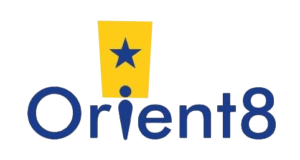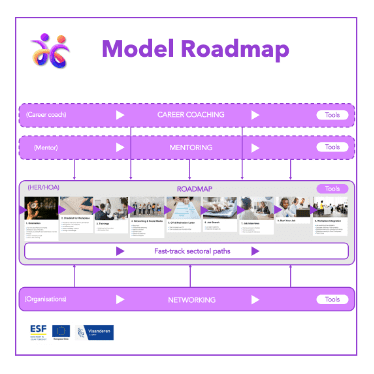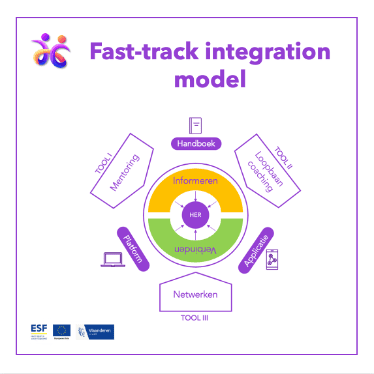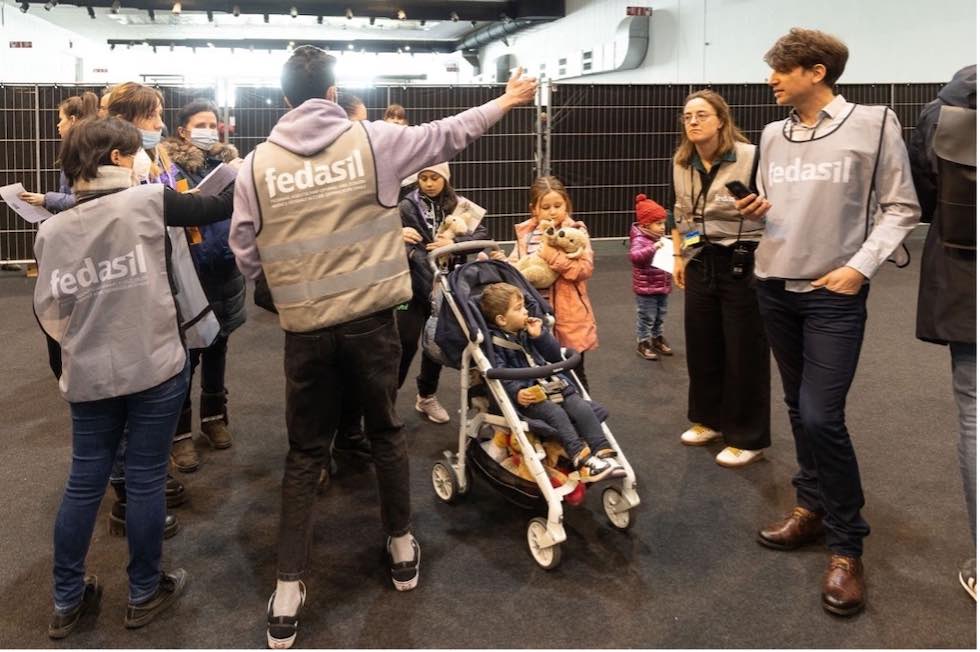
Ukrainian refugees arrived in Belgium (Source: Belga)
1. Background
The Russian invasion of Ukraine has raised the alarm for the neighbouring countries and Europe forcing an unexpected large-scale refugee flow from Ukraine. This is the second mass flow to Europe after the 2015 Syrian refugee crisis in this century and is estimated to be the biggest after WW2.
According to the UNHCR, the number of refugees who entered European countries has already passed 4,3 million in only 6 weeks after the invasion started, 90% of whom are women and children. 12 million people have been affected by the conflict situation and 6,6 million have been internally displaced, and many more will be displaced as the conflict continues.
1.1 European Rapid Response to the Ukrainian refugees
In response to the situation, the European Union has activated for the first time its Temporary Protection Directive to provide immediate, temporary protection to refugees, granting beneficiaries immediate access to education, housing and healthcare services as well as the right to work. The EU and member states have opened their borders to the displaced people fleeing from the war, showing great solidarity to address the needs of displaced people from Ukraine. The Commission outlined its operational guidelines for the very substantial support the EU is making available to help people fleeing war in Ukraine, as well as the EU countries receiving them.
The Commission also published Information for people fleeing the war in Ukraine to inform about their rights. The Immediate accommodation is being provided by the authorities or by the civil society. National administrations now face an enormous challenge to make such access a reality.
1.2 Initial Belgian Response to the Ukrainian Refugees
Taking the advantage of experienced institutions and vibrant civil society, Belgium reacted quickly to the current situation. However, a humanitarian crisis of this size has problems of its own. Officials estimate that Belgium will receive about 120.000 Ukrainian refugees throughout the war. Just to make a comparison and better understand the magnitude of the problem, according to the figures published by the Office of the Commissioner General for Refugees and Stateless Persons (CGRA/CGVS), 25.971 persons submitted an application for international protection in Belgium from all over the world in 2021. And this corresponds to a 53,6% increase when compared to 2020 (16.910). Between 24 February 2022 (the date that the war broke out) and 5 April 2022 there were 28.590 people who received temporary protection from Ukraine alone. 90% of Ukrainian refugees are women and children. From the outset, Belgian authorities established a separate in-processing pipeline for the Ukrainian refugees. And when needed, they scaled up the capacity.
The most demanding task is to find an immediate shelter for these people, a responsibility shared between all layers of state and citizens. To this end;
- The Flemish government, together with the local authorities aims to realise 18.000 reception places by the end of March. Additionally, the government considers building 15 emergency villages (nooddorp) to meet the demand for 120.000 possible Ukrainian refugees. One of the emergency villages will be opened in Mechelen, one of the municipalities that implement project ORIENT8, with an initial capacity of 600 people which can be extended to 1000, if needed,
- Flemish Parliament temporarily eased quality standards in the rental regime, allocated vacant social spaces suitable for collective housing (such as monasteries and hospitals) and tasked the Flemish Social Housing Society (Vlaamse Maatschappij voor Sociaal Wonen – VMSW) for preparing mobile housing units,
- The Flemish Government provided €1.000 per reception location for cities and municipalities and another €400 per reception location from private individuals (more than 6.000 Flemish volunteered as host family candidates),
- A screening procedure developed for families who want to receive Ukrainian refugees.
In tandem with the main effort (housing), several other measures are being taken simultaneously;
- Flemish authorities provided preventive health measures for the refugees such as screening for/vaccination against tuberculosis, COVID-19, measles, mumps, rubella (MBR) and diphtheria, tetanus and pertussis,
- Give a Day, the largest volunteer job bank in Belgium, launched an online platform for people who want to help Ukrainians,
- 45% tax deduction provided for the donations higher than €40 for selected aid organisations (Consortium 12 12, in partnership with Flemish Red Cross) helping Ukrainian refugees.
- Automatic grant of a living allowance (leefloon) upon registration is being discussed at the federal level.
Measures related to social orientation;
- Civic Integration Agency (Agentschap Integratie en Inburgering) organised online info sessions in the Ukrainian language about staying in Flanders,
- The Flemish Ministry of Education is considering opening schools in emergency villages, alongside current schools, in order both to teach them Dutch and to keep children continuing their education without interruption.
Measures related to labour market integration;
- Flemish Service for Employment and Vocational Training (VDAB) is responsible for integrating Ukrainian refugees to the labour market. It focuses on additional language training and mentoring for these people. It will filter and tag (#werkplekvrij) suitable jobs for Ukrainian refugees. As of 5 April 2022, 2589 positions are put on the VDAB portal,
- Although currently available jobs are generally temporary, they are still an option for the Ukrainian refugees.
- On the other hand, Minister Crevits said Ukrainian refugees will not solve the talent shortage on the Flemish labour market. They will mostly get temporary positions.
3. The Challenges for Orientation and Labour Market Integration of Ukrainian Refugees
The unprecedented and urgent occurrence of such a huge flow brings many challenges to the national, regional and local authorities. Although the 2014-15 Syrian refugee crisis was a big experience, the initial one month period indicated that Belgium and Flanders were not ready for handling the reception of such a big flow with almost no preparation period. Civil society organisations and volunteers tried to fill in the gap showing big solidarity in Flanders, Belgium.
3.1 Challenges for Orientation (early stage of integration)
Orientation to the new community is an important phase in the early stages of integration. Orientation simply means “familiarisation with something”. When it comes to social orientation, we refer to the introduction of the roles, rights and responsibilities that the newcomer could/should play and assume in the host community. Stabilising life by meeting urgent needs, such as housing, healthcare, and education, is mainly the initial goal of newcomers’ orientation.
The current situation that Ukrainian refugees are experiencing poses particular challenges;
- The vast majority of the Ukrainian refugees (90 per cent) are women and children. Leaving behind husbands/partners and relatives in Ukraine at war and assuming the responsibility of the rest of the family bring additional burden to the women/mothers in an already very tense situation.
- To a certain degree, “fog of war” still exists in Ukraine. For the time being, nobody can predict the outcome of the war, when or how it will end. This uncertainty keeps newcomers constantly in limbo and they might refrain from accepting the situation that they are in which eventually precludes them from using their true potential in adapting to their new lives.
- The psychological situation and trauma caused by the war and the “road” is difficult to cope with.
- The language barrier is an important obstacle for every newcomer to overcome. But for the Ukrainian refugees, this is a particular challenge since Ukraine was not among the countries that “export refugees” until recently. Thus, Ukrainian was not among the languages that integration agencies and other stakeholders offer services.
- Ordinary refugees have some time to organise their “trips” and make some preparations for the life that awaits them. For Ukrainian newcomers, almost everything happened all of a sudden.
3.2 Challenges for Labour Market Integration
Labour market integration of newcomers includes all efforts for the process of building a sustainable path toward employment, finding a job and getting integrated into the workplace in the host country.
Better and early orientation has a positive effect also on the labour market integration of newcomers. Stabilising the living conditions in the host country by meeting more urgent needs, such as housing, healthcare, and education, is mostly a precondition for newcomers to get into the next step of integration which is the labour market.
Employment is a key dimension of integration. Many arrivals are joining families and friends in the EU countries, this means that networks can play an important role in supporting labour market integration. Employers are optimistic about the reception capacities of national labour markets, while private sector labour shortages may bring opportunities for quick access to employment for some. However, it is likely that many will face challenges in entering the labour market.
Based on the initial talks with the civil society organisations, practitioners and the Ukrainian refugees and considering the All-in-one 4HER research “Labour Market Integration Challenges of Highly Educated Refugees in Flanders” (English version), the Ukrainian newcomers’ challenges can be summarised as follows in addition to orientation challenges.
- Although the Ukrainian refugees are granted an automatic work permit in Belgium, the vagueness of the situation and the status of limited temporary protection can limit / effect newcomers’ decisions and motivation on building a medium/long term plan in the host country.
- As many refugees find themselves in a similar situation, Ukrainian newcomers can have lack of information and guidance at their level in the host country about the labour market conditions and opportunities.
- The language barrier will be the main challenge for newcomers with limited language skills. Although most of the generation younger than 35 has a level of English to be able to communicate, the older generation has a very limited percentage of those having language skills. Those with a level of English would have more chances to have fast-track employment considering the need for talents in several sectors.
- Recognition and translation of skills and qualifications is another challenge for newcomers. Considering the procedures and waiting lists, it will take at least months to complete the processes. This can bring skill mismatch problems and increase the chance of overqualified working for highly educated ones.
- The Belgian labour market has its own way and culture, and the newcomers need to adapt to the new environment. In this respect, Ukrainian refugees would need support for orientation and guidance.
- Since most of the newcomers are women and children, the women with children have responsibilities of childcare and they would need childcare support for employment.
4. Models for facilitating orientation and labour market integration
In this policy brief we suggest two models for facilitating and accelerating (1) the initial orientation, and (2) the labour market integration of newly arrived Ukrainian refugees.
4.1 Early-stage integration (orientation) of Ukrainian newcomers to Flemish society (ORIENT8 model)
Short explanation
| Name |
Orientate Newcomers by Smart Social Mentoring (ORIENT8) |
| Aim | to improve the social orientation of newcomers, promote exchanges between newcomers and host societies and improve transnational cooperation and knowledge among practitioners. |
| Target group | ORIENT8’s primary target group is newly arrived (less than 5 years) third-country nationals (TCN). The secondary target group is the members of the local communities who are expected to interact with newcomers. In the long term, practitioners are among the beneficiaries who will make use of the mentoring program and tools. |
| Outputs |
The main output of ORIENT8 is an “effective, efficient and durable” social mentoring program. Using initial guidelines for social mentoring programmes for newcomers we formalised a full-fledged mentoring programme covering all mentoring steps (recruitment, selection, matching, mentoring, closure) and tailored particularly to the needs of newcomers. To support the mentoring program we also develop a number of deliverables, inter alia; (1) Matching criteria, (2) Initial Guidelines for Social Mentoring Programmes for Newcomers, (3) Smart matching tool, (4) Welcome Application |
| Website | https://orient8.eu |
| Explanation |
Orientate Newcomers by Smart Social Mentoring (ORIENT8) is a smart social mentoring program supported by smart digital tools and tailored activities. It pairs newly arrived third country nationals (Third Country Nationals – TCNs or newcomers) with the volunteer members of the local community in order to help them overcome daily life difficulties at the early stages of their integration process through a four to six month long voluntary mentoring relationship. Designed as an early-stage integration project, ORIENT8 aims to improve the social orientation of newcomers, promote exchanges between newcomers and host societies and improve transnational cooperation and knowledge among practitioners. ORIENT8 started in 2021 and will last 24 months. ORIENT8 has received funding from the European Union’s Asylum Migration and Integration Fund (AMIF). Beyond the Horizon ISSG, KU Leuven, Stad Mechelen (Belgium), Municipality of Nikaia – Rentis (Athens/Greece), Sala Kommun (Sweden) are partnering in the project. To support the mentoring program we also develop a number of deliverables, inter alia; · Initial Guidelines for Social Mentoring Programmes for Newcomers: Initial Guidelines is for service providers who want to set up a social mentoring program aimed at foreign-language newcomers. We describe common practices and offer recommendations for each step of the mentoring process (recruitment, selection, matching, mentoring, closure). · Smart Matching Tool: Based on the matching criteria, a digital matching tool (using Artificial Intelligence) is being developed by BtH/Clarusway DE, and is currently being tested by implementing partners to register and assist the matching of mentors and newcomers. Smart Matching Tool (SMT) is a Machine Learning application. With the Smart Matching Tool, we aim to make the best possible match between mentors and mentees using all available data and the tacit knowledge that is inherently hidden in the data. · Welcome Application: One of the major deliverables of ORIENT8 project is a mobile welcome application that serves as a one-stop-shop to bring all useful information, links about public and places for the newcomers in the defined scope which will be accessed and used easier on mobile iOS and Android smartphones. Welcome Application aims to enhance newcomers’ awareness about the new local environment. · An evaluation frame is also being developed for the programme. |
What we offer
ORIENT8 might contribute to the orientation requirements of newly arrived Ukrainians in Europe. It provides practical deliverables for early-stage integration of newcomers to the host society, which are being tested in three different municipalities for the time being and be applicable to the current situation soon.
One of the best ways to get newcomers orientated to the host society can be through mentoring. What most countries did to handle the crisis is to provide accommodation to the Ukrainian refugees through volunteers. This relationship can be extended to voluntary mentoring with minimum effort provided that necessary tools are already in place. Currently, the applications that support social mentoring in ORIENT8 are in the testing/piloting phase. But by the end of 2022, they will hopefully be mature enough to serve the community.
In line with the project plan, the Welcome Application supports English and three other local languages (Dutch, Greek and Swedish). However, a number of volunteers/interns proofread machine-translated content which will enable the Welcome Application to run on Arabic, French, Spanish, Russian and Turkish. With volunteer support, we may add Ukrainian to the portfolio as well. Alternatively, as a quick solution, we can use machine-translated content without proofreading which provides varying degrees of translation accuracy depending on the trained models that are being used.
What we need
- Enhanced coordination among stakeholders, particularly among practitioners (municipalities, governmental organisations tasked with providing solutions to the crisis, mentoring organisations, NGOs working in the social profit sector and IT companies that have the potential to provide out of the box ideas) including initiatives and consortia working on integration, in order to find ways to tackle current crisis,
- Orchestration of efforts through policy and continuous consultation,
- More voluntary support both from individuals and organisations,
- Support for the projects that have the potential to provide solutions for scaling up,
- Make the best use of the state of the art, including AI-powered solutions.
4.2 Fast-track labour market Integration of highly educated Ukrainian newcomers (All-in-one4HER model)
Short explanation
| Name | 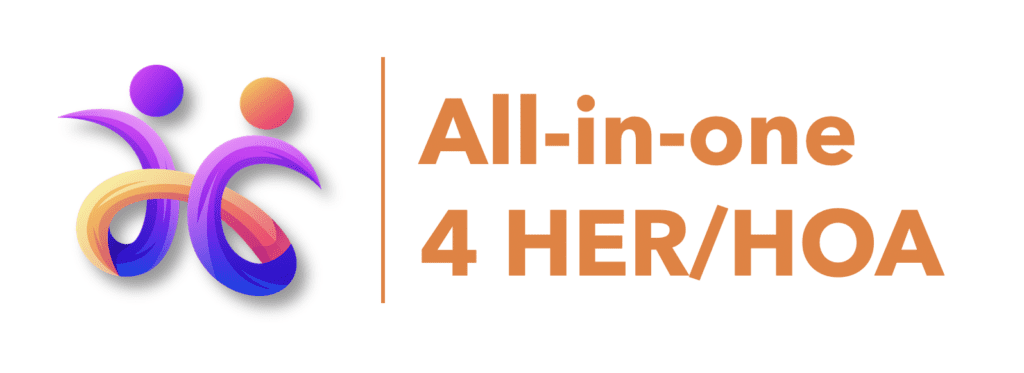 Fast-track integration of highly educated newcomers (refugees and non-natives) into the Flemish labour market |
| Aim | Improve and accelerate the labour market integration process of highly educated newcomers by informing and connecting |
| Target group | Refugees and newcomers with a higher education level (HER and HOA) |
| Outputs |
A model for fast-track integration includes: (1) digital platform, (2) mobile application, (3) handbook |
| Website | https://www.all-in-one4her.eu |
| Explanation |
The ESF Flanders funded project “All-in-one 4HER” developed and piloted a model for accelerating the integration of highly educated newcomers into the labour market. This model can be used by newcomers themselves, but also by organisations involved in integration and employers. The project research finds that highly educated newcomers need more targeted and necessary information and guidance at their level in the early stages of their arrival to make their decision on how to use their background and competencies in the new host country. The model is based on (1) INFORMING newcomers (as soon as possible) in different languages (English, Dutch, Arabic) about the steps to be taken for integration based on a roadmap and available sector-specific pathways and (2) CONNECTING them (at the right time) with other supporting actors by matching them with mentors, coaches and supporting organisations, and also making their profiles available for interested employers.
The model uses a combination of three supporting tools to facilitate and accelerate this process, namely: (1) mentoring to work, (2) career coaching, and (3) networking to work. Based on the newcomer’s needs, one/more of these tools help the newcomers to build a sustainable path toward a job and find a job. The model is concretely operationalized in the form of a digital platform and a user-friendly application managed by an admin user. In the figures, the ‘model concept’ is presented with the elements and the ‘accelerated integration model’ is presented on a timeline. |
What we offer
Ukrainian refugees with a higher education level constitute perfect fit for the target group of All-in-one 4HER model and outputs. This model can help inform Ukrainian refugees on the Belgian labour market and connect them with the supporting actors including coaches, mentors and other supporting organisations.
It can help them to build a sustainable path towards a job with necessary information and guidance through a combination of career coaching, mentoring and networking. It can match Ukrainian refugees with registered volunteer mentors and coaches. It can help them to have access to different studying and working opportunities, and make their profiles available for interested employers in Flanders. Some employers are already supporting the platform with their corporate social responsibility programmes, including volunteer mentoring and group/individual coaching.
As a follow-up project, Supermentor (ESF Flanders) is developing a blended online training for volunteer mentors who are supporting jobseekers with a migrant background. Once finalised, the training can support mentors, coaches and organisations that will be supporting the integration of Ukrainian refugees.
The supporting mechanism starts with the registration of the refugee on the digital platform or application. As a second step, the registrants are contacted by the platform admin for an in-take session where the basic information and needs of the mentee are better understood. The next step is to match the refugee, based on the needs, with a volunteer mentor, coach, supporting organisation or directly with the employer. The supporting process can take 4-6 months for each refugee.
What we need
- Translation of the information on the digital platform to Ukrainian as an additional language
- Translation support for individual contact and support as necessary for refugees without English, Dutch language skills
- Mobilising more volunteer coaches and mentors in addition to the currently registered ones
- Training of mentors and coaches (This can be supported by the Supermentor project)
- Getting more employers on the platform who want to hire newcomers
5. Recommendations
Although Flanders built an experience of refugee integration in the last decade, the integration of Ukrainian refugees will still be a big challenge for the regional and local authorities. In this policy brief, we focus on facilitating and accelerating their early-stage integration (orientation) and labour market integration. Based on two different models including tools developed and tested in EU and Flemish government-funded project settings, we offer policy implementation solutions and recommendations to the Flemish and other European regional and local authorities.
Orientation of Ukrainian refugees
- Mobilising volunteers, particularly via duo projects, proved successful in integration. Projects like ORIENT8 offer ready to use solution sets.
- Language competency is pivotal for successful integration. Therefore, making intensive Dutch courses (ideally from A0 to B2 in one year, in tandem with vocational training) available for highly educated Ukrainians is a must.
- Content developed for Ukrainian newcomers needs to be in their language alongside the local language (Dutch). This is crucial for the success of early-stage integration activities.
- Mobilising non-profit organisations that work in integration sector might ease the tasks that government agencies are currently dealing with.
- Mobilising the Ukrainian diaspora, expediting mobilisation through corps diplomatique of Ukraine (also important for screening) to the maximum extent possible is a force multiplier.
- Special attention is required to the needs of children. The most demanding issue is their education. Reception education for non-Dutch speaking children (Onthaalonderwijs voor Anderstalige Kinderen – OKAN) can be reinforced by buddying particularly with the help of the Ukrainian diaspora.
- PTSD / Mental health support at all phases of integration will be needed.
- Prepare the Flemish community through a targeted information campaign for the fact that a great deal of Ukrainians will not be able to return to their countries at least for a while.
Integration into the Flemish labour market
- The All-in-one 4HER model can be used as a complementary tool for the integration of Ukrainian refugees into the labour market in addition to the support given by the government agencies. Volunteer support and the network of civil society organisations have a big potential to facilitate this process.
- The model can be used by local initiatives separately, by civil society organisations that have the capacity to mobilise volunteer mentors, and coaches and get local employers into the network who would like to support refugees (including those having corporate social responsibility programmes).
- Translation of the information on the digital platform and the application to Ukrainian as an additional language will contribute to the platform. On the other hand, Ukrainian interpreting support for individual contact and support as necessary for refugees without English, and Dutch language skills would be useful.
- Mobilising more volunteer coaches and mentors in addition to the currently registered ones would be of great value. Then there would be a need for training these mentors and coaches for effective support. This can be organised as a part of Supermentor project (ESF), which aims to train volunteer mentors and mentoring programmes supporting jobseekers with migrant backgrounds in finding a job.
- Getting more employers who want to hire newcomers on the platform and in the network would be of great value as well. Corporate social responsibility policies of companies and employers can in this sense be helpful. This can bring more support from employers.
References
CGRA/CGVS (March 2022). Figures. Retrieved on 4 April 2022 from https://www.cgrs.be/en/figures
EUAA (2022). Rapid response by EU+ countries to address the needs of displaced people from Ukraine. Retrieved on 1 April 2022 from https://euaa.europa.eu/publications/rapid-response-eu-countries-address-needs-displaced-people-ukraine-0
European Commission (18 March 2022). Ukraine refugees: Operational guidelines to support Member States in applying the Temporary Protection Directive. Retrieved from https://ec.europa.eu/commission/presscorner/detail/en/IP_22_1727
European Commission (8 March 2022). European solidarity with refugees and those fleeing war in Ukraine. Retrieved from https://ec.europa.eu/info/sites/default/files/com_2022_107_1_en_act_part1_v4.pdf
Hoffman, M. (18 March 2022). Getting Ukrainian refugees into work: The importance of early competence checks. ICMPD. Retrieved from https://www.icmpd.org/blog/2022/getting-ukrainian-refugees-into-work-the-importance-of-early-competence-checks
Knack (2022). Live Oorlog in Oekraïne. Retrieved on 5 april 2022 from https://www.knack.be/nieuws/wereld/oorlog-in-oekraine-vooruitgang-in-gesprekken-rusland-gaat-aanvallen-rond-kiev-fundamenteel-terugschroeven/live-normal-1837557.html
Mouton, A. (24 March 2022). Vluchtelingen zullen krapte op arbeidsmarkt niet oplossen, Trends. Retrieved on 3 April 2022 from https://trends.knack.be/economie/beleid/vluchtelingen-zullen-krapte-op-arbeidsmarkt-niet-oplossen/article-longread-1849501.html
UNHCR (2022). Operational data portal: Ukraine refugee station. Retrieved on 6 April 2022 from https://data2.unhcr.org/en/situations/ukraine
Yilmaz, F. & Aktas, F. (2021). Labour Market Integration Challenges of Highly Educated Refugees in Flanders, Horizon Insights, 4(2), 1-10. https://doi.org/10.31175/hi.2021.02.01
Yilmaz, F., Van den Berckt, I. & De Winter, H. (2021). Versnelde Integratie van Hoogopgeleide Vluchtelingen (HER) en Anderstaligen (HOA) op de Vlaamse Arbeidsmarkt: Handboek voor integratie ondersteuners. Beyond the Horizon, Brussels.
Acknowledgements
We’d like to thank the practitioners, organisations and volunteers who contributed to our work by sharing their experiences, views and insights, namely Promote Ukraine, Acerta, partner organisations of the projects: All-in-one4HER, Supermentor and ORIENT8.
This policy brief is financed by the European Union AMIF and ESF Flanders.
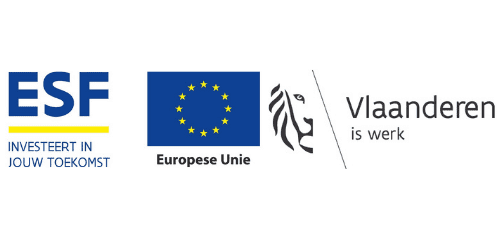
(1) This policy brief is financed by the European Union Asylum, Migration and Integration Funds (AMIF) and European Social Funds (ESF) Flanders.
(2) Research Fellow at Beyond the Horizon vzw, Project Manager of All-in-one 4 HER (ESF) and Supermentor (ESF)
(3) Research Fellow at Beyond the Horizon vzw, Project Manager of ORIENT8 (AMIF)


